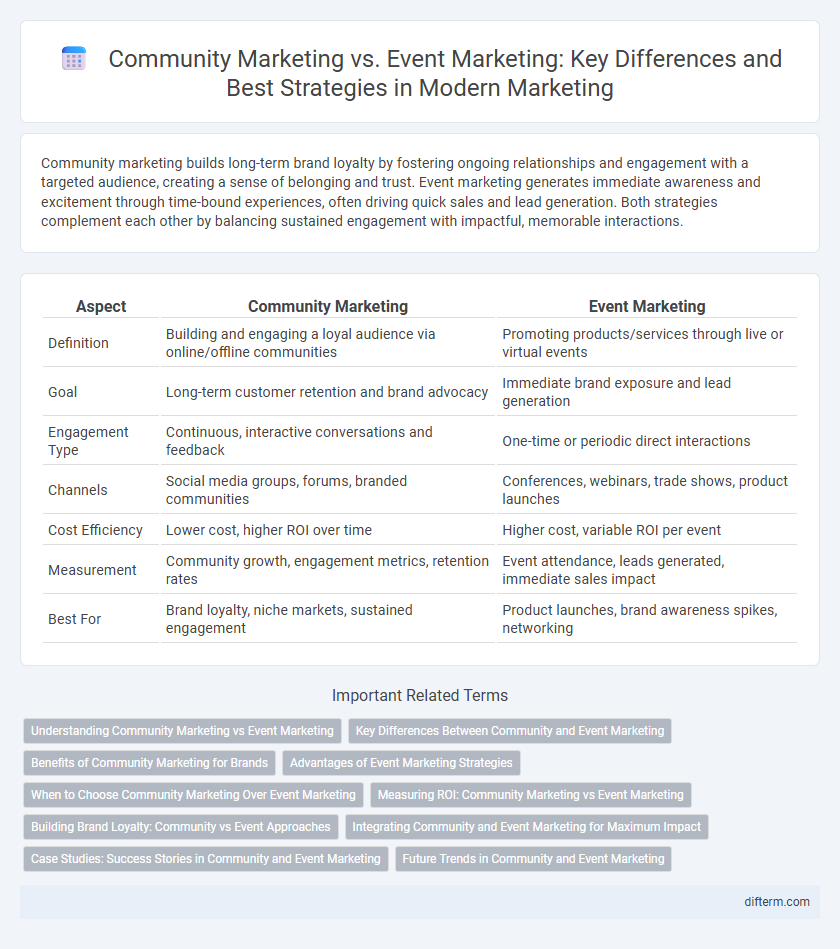Community marketing builds long-term brand loyalty by fostering ongoing relationships and engagement with a targeted audience, creating a sense of belonging and trust. Event marketing generates immediate awareness and excitement through time-bound experiences, often driving quick sales and lead generation. Both strategies complement each other by balancing sustained engagement with impactful, memorable interactions.
Table of Comparison
| Aspect | Community Marketing | Event Marketing |
|---|---|---|
| Definition | Building and engaging a loyal audience via online/offline communities | Promoting products/services through live or virtual events |
| Goal | Long-term customer retention and brand advocacy | Immediate brand exposure and lead generation |
| Engagement Type | Continuous, interactive conversations and feedback | One-time or periodic direct interactions |
| Channels | Social media groups, forums, branded communities | Conferences, webinars, trade shows, product launches |
| Cost Efficiency | Lower cost, higher ROI over time | Higher cost, variable ROI per event |
| Measurement | Community growth, engagement metrics, retention rates | Event attendance, leads generated, immediate sales impact |
| Best For | Brand loyalty, niche markets, sustained engagement | Product launches, brand awareness spikes, networking |
Understanding Community Marketing vs Event Marketing
Community marketing builds long-term relationships by engaging a targeted group of loyal customers who advocate for the brand, fostering trust and ongoing interaction. Event marketing concentrates on creating memorable, one-time experiences designed to generate immediate buzz and direct sales opportunities. Understanding the distinction helps marketers allocate resources effectively to either sustain brand loyalty or drive short-term awareness and conversions.
Key Differences Between Community and Event Marketing
Community marketing builds long-term relationships by fostering engagement and loyalty within a targeted group, leveraging continuous interaction and shared values. Event marketing centers on one-time or periodic branded experiences designed to generate immediate interest, buzz, and lead generation through live interactions or virtual gatherings. The key differences lie in community marketing's focus on sustained connection and brand advocacy versus event marketing's emphasis on creating impactful, time-sensitive touchpoints for customer acquisition.
Benefits of Community Marketing for Brands
Community marketing fosters long-term brand loyalty by creating authentic connections between customers and brands, resulting in higher customer retention and lifetime value. It enables brands to gather valuable insights through direct interactions, leading to more personalized and effective marketing strategies. Consistent engagement within a community builds trust and advocacy, turning customers into brand ambassadors who amplify organic reach.
Advantages of Event Marketing Strategies
Event marketing strategies drive direct customer engagement and foster real-time brand experiences, boosting emotional connections and brand recall. These campaigns create immediate opportunities for lead generation and sales conversion through interactive demos and exclusive offers. High visibility events also amplify word-of-mouth promotion and social media buzz, expanding reach beyond the physical attendees.
When to Choose Community Marketing Over Event Marketing
Choose community marketing over event marketing when aiming for long-term customer engagement and brand loyalty, as it fosters ongoing interactions through forums, social media groups, and interactive content. Community marketing is ideal for building a dedicated customer base that drives organic brand advocacy and sustained consumer insights. Event marketing suits short-term promotions but lacks the continuous relationship development offered by community-driven strategies.
Measuring ROI: Community Marketing vs Event Marketing
Measuring ROI in community marketing often involves tracking long-term engagement metrics such as customer lifetime value, retention rates, and advocacy growth, reflecting sustained brand loyalty. Event marketing ROI typically centers on immediate results like attendee numbers, lead generation, and sales conversions during or shortly after the event. Leveraging analytics tools tailored to each approach enhances accuracy in quantifying the financial impact and strategic value of community versus event marketing initiatives.
Building Brand Loyalty: Community vs Event Approaches
Community marketing fosters brand loyalty through sustained engagement, creating a sense of belonging and continuous interaction that deepens emotional connections with the audience. Event marketing generates short-term excitement and brand recall by providing immersive, memorable experiences that drive immediate engagement. While community marketing builds long-term loyalty through trust and shared values, event marketing leverages impactful moments to accelerate brand awareness and customer acquisition.
Integrating Community and Event Marketing for Maximum Impact
Integrating community marketing with event marketing enhances brand engagement by leveraging the loyalty of established communities and the immersive experience of live events. Utilizing data from community interactions allows marketers to tailor event content, increasing relevance and participation rates. This combined strategy fosters sustained customer relationships while driving immediate event attendance and long-term brand advocacy.
Case Studies: Success Stories in Community and Event Marketing
Case studies reveal how community marketing drives long-term brand loyalty through sustained user engagement and authentic relationships, exemplified by brands like LEGO that cultivate active fan communities for product feedback and advocacy. Event marketing showcases impactful, time-sensitive brand experiences, as seen with Apple's product launches, which generate significant media buzz and immediate sales spikes. Both strategies leverage their unique strengths to enhance customer connection and business growth depending on campaign objectives.
Future Trends in Community and Event Marketing
Future trends in community marketing emphasize personalized engagement through AI-driven insights and immersive digital platforms that foster long-term loyalty. Event marketing is shifting towards hybrid experiences, blending virtual and physical attendance to maximize reach and data collection. Both strategies increasingly leverage real-time analytics and interactive technologies to create dynamic, customer-centric campaigns.
Community marketing vs event marketing Infographic

 difterm.com
difterm.com